

NSA Insiders Reveal What Went Wrong. In a memo to President Obama, former National Security Agency insiders explain how NSA leaders botched intelligence collection and analysis before 9/11, covered up the mistakes, and violated the constitutional rights of the American people, all while wasting billions of dollars and misleading the public.
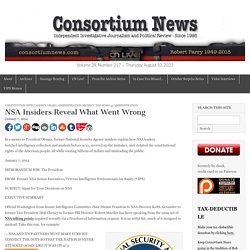
January 7, 2014 MEMORANDUM FOR: The President FROM: Former NSA Senior Executives/Veteran Intelligence Professionals for Sanity (VIPS) SUBJECT: Input for Your Decisions on NSA. Russ Tice. Career[edit] Tice worked as an intelligence analyst for the U.S.
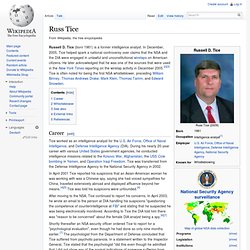
Air Force, Office of Naval Intelligence, and Defense Intelligence Agency (DIA). During his nearly 20-year career with various United States government agencies, he conducted intelligence missions related to the Kosovo War, Afghanistan, the USS Cole bombing in Yemen, and Operation Iraqi Freedom. Tice was transferred from the Defense Intelligence Agency to the National Security Agency in 2002. In April 2001 Tice reported his suspicions that an Asian-American woman he was working with was a Chinese spy, saying she had voiced sympathies for China, travelled extensively abroad and displayed affluence beyond her means.[4][5] Tice was told his suspicions were unfounded.[4] Interview with Whistleblower Russ Tice. 'Courage Is Contagious': Additional NSA Employees Said to Be Following Snowden's Lead. Homeland Security logo reflected in the eyeglasses of a cybersecurity analyst at the agency’s secretive cyber defense facility in Idaho.
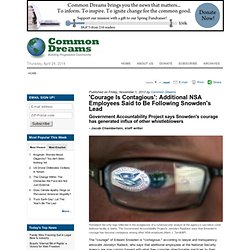
The Government Accountability Project's Jesselyn Raddack says that Snowden's courage has become contagious among other NSA employee. (Mark J. Terrill/AP)The "courage" of Edward Snowden is "contagious," according to lawyer and transparency advocate Jesselyn Radack, who says that additional employees at the National Security Agency are now coming forward with what they consider objectionable practices by their employer. Jesselyn Raddack, Government Accountability Project. (Screenshot: ABC News) In an interview with ABC News on Thursday, Raddack revealed that an influx of NSA whistleblowers, inspired by Snowden, are now knocking on the doors of her organization.
Allons nous vers une Cyber Dictature ? E. Filiol (ex DGSE, hacker) , J. Zimmermann (QDN) Students DESTROY NSA Recruiters Over Illegal Spying and Lies (Listen) Activist Post When NSA recruiters went to the University of Wisconsin earlier this week to pitch language students on working for the agency, they got more than they bargained for.
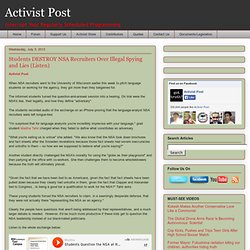
Students Question the NSA at Recruiting Session by Madiha. 'After 9/11 NSA had secret deal with White House' John Perkins. Thomas Andrews Drake. Thomas Andrews Drake (born 1957) is a former senior executive of the U.S.
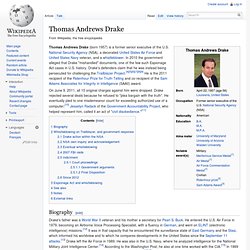
National Security Agency (NSA), a decorated United States Air Force and United States Navy veteran, and a whistleblower. In 2010 the government alleged that Drake "mishandled" documents, one of the few such Espionage Act cases in U.S. history. Drake's defenders claim that he was instead being persecuted for challenging the Trailblazer Project.[4][5][6][7][8][9] He is the 2011 recipient of the Ridenhour Prize for Truth-Telling and co-recipient of the Sam Adams Associates for Integrity in Intelligence (SAAII) award. On June 9, 2011, all 10 original charges against him were dropped. Drake rejected several deals because he refused to "plea bargain with the truth". Biography[edit] Drake's father was a World War II veteran and his mother a secretary for Pearl S. Washington Spectator: NSA Analyst: "We Could Have Prevented 9/11" Thomas Drake, a brilliant intelligence analyst, software engineer, and IT management consultant, worked at the CIA in the 1980s, then as a contractor at the National Security Agency (NSA), and ultimately as an NSA senior executive in 2001.
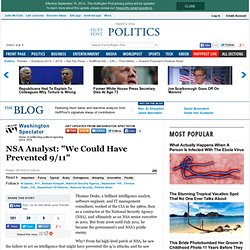
But from 2006 until July 2011, he became the government's and NSA's public enemy. The FRONTLINE Interview: J. Kirk Wiebe. You're basically being labeled the enemies of the state here.
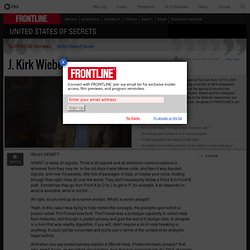
What are you thinking? The whole impact of this, of this losing the argument at NSA on ThinThread, ultimately being raided by the Federal Bureau of Investigation, was sending a clear signal that my government did not like me, and I was trying to understand why after -- you know, this button is NSA's second highest award, and I wonder what it was that I did personally so wrong that I deserve this kind of treatment.
So yeah, it created a lot of soul searching. The FRONTLINE Interview: Edward Loomis. So what happens next?
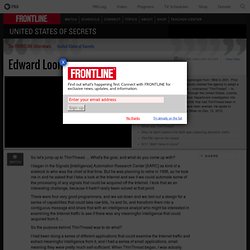
William Binney (U.S. intelligence official) William Edward Binney[2] is a former highly placed intelligence official with the United States National Security Agency (NSA)[3] turned whistleblower who resigned on October 31, 2001, after more than 30 years with the agency.
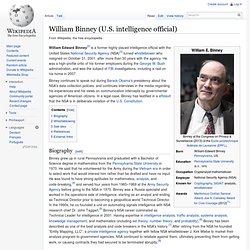
3 NSA veterans speak out on whistle-blower: We told you so. When a National Security Agency contractor revealed top-secret details this month on the government's collection of Americans' phone and Internet records, one select group of intelligence veterans breathed a sigh of relief.
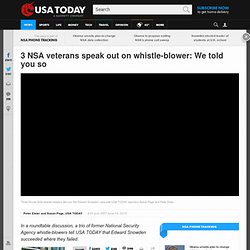
Thomas Drake, William Binney and J. Kirk Wiebe belong to a select fraternity: the NSA officials who paved the way. For years, the three whistle-blowers had told anyone who would listen that the NSA collects huge swaths of communications data from U.S. citizens.
Peter Greenwald. NSA surveillance is an attack on American citizens, says Noam Chomsky. The actions of the US government in spying on its and other countries' citizens have been sharply criticised by Noam Chomsky, the prominent political thinker, as attacks on democracy and the people. "Governments should not have this capacity. But governments will use whatever technology is available to them to combat their primary enemy – which is their own population," he told the Guardian. In his first public comment on the scandal that has enveloped the US, UK and other governments, as well as internet companies such as Google and Microsoft, Chomsky said he was not overly surprised technology and corporations were being used in this way.
"This is obviously something that should not be done. But it is a little difficult to be too surprised by it," he said. Meandering thoughts on the NSA scandal. As an activist, a geek, and a privacy scholar, I’ve been watching the NSA scandal unfold with a mixture of curiosity, outrage, and skepticism. I don’t feel as though I have enough information yet to make an informed opinion about exactly what the State is doing or how tech companies are involved, let alone the implications of these procedures.
But one thing I do know is that most Americans are going to shrug their shoulders and move on while most of my friends are going to rally for increased transparency, governmental oversight, corporate commitments to resist governmental abuse, and efforts to better inform the public. And although I share all of their values and desires, I also feel the need to reflect on why I think that our activism as it is currently constructed is not going to rally the mainstream.